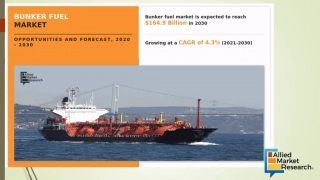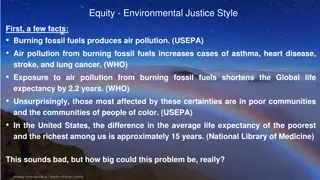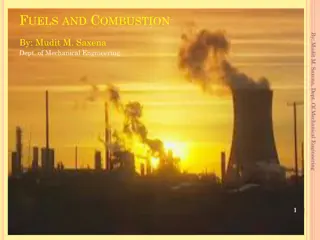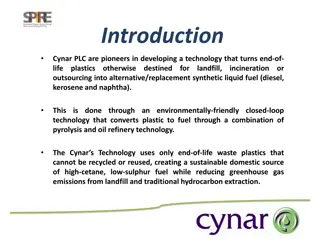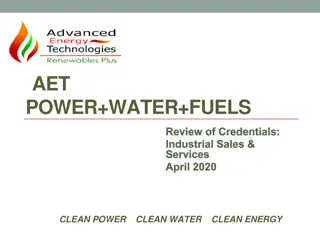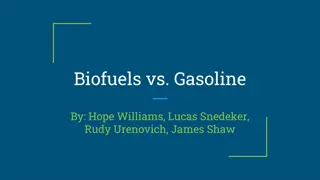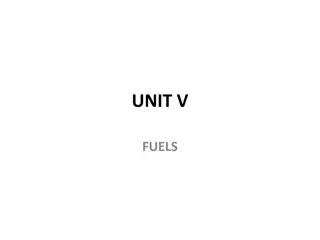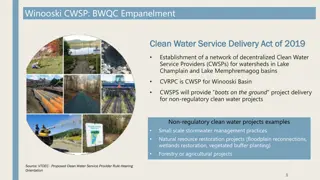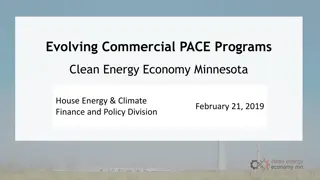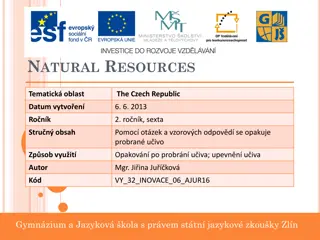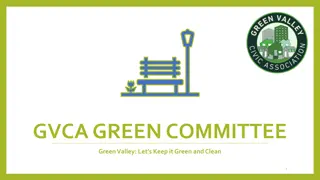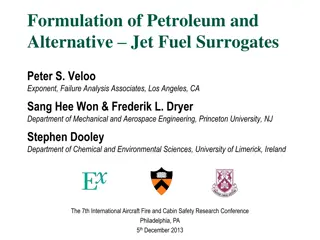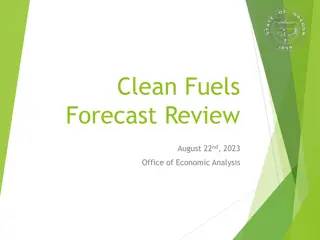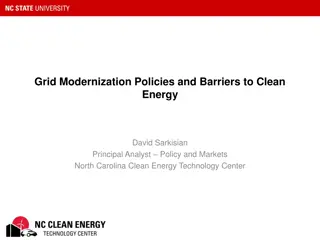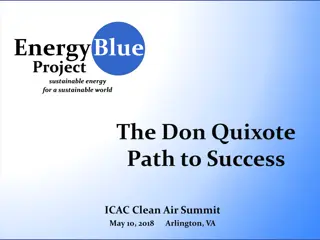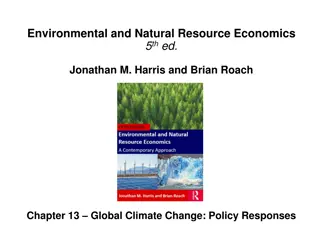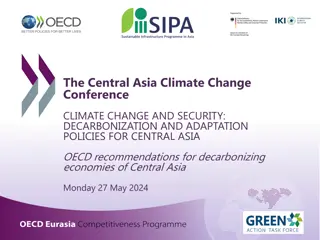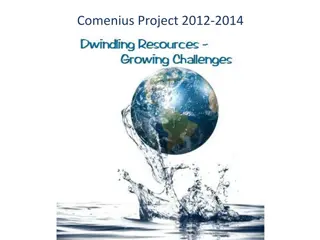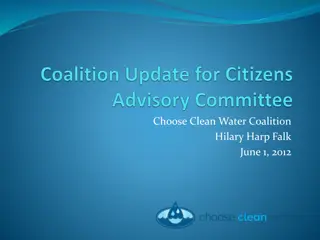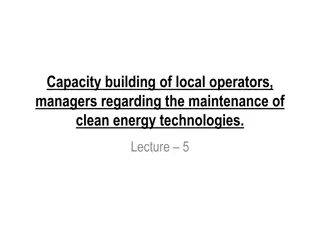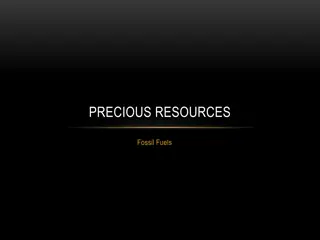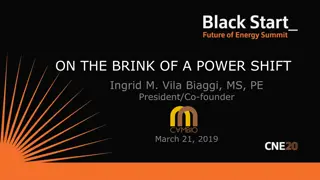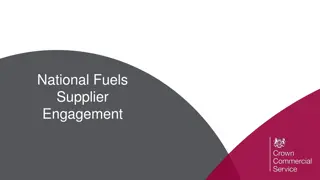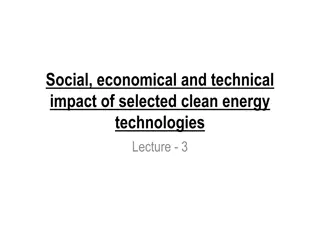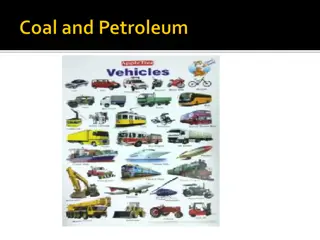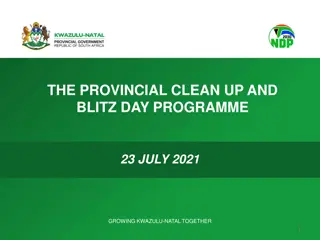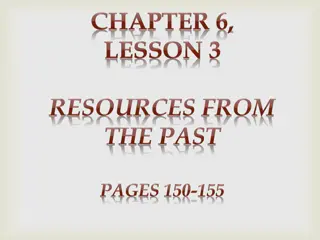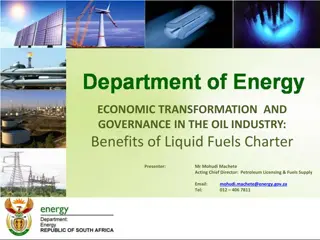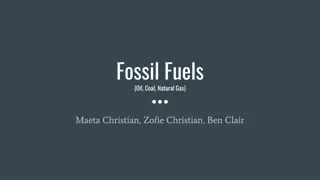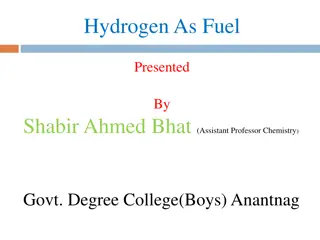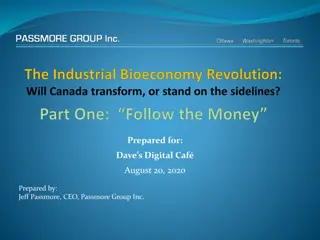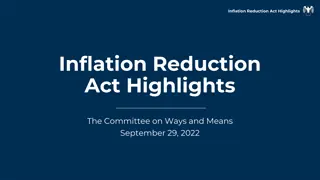Bunker Fuel Market
Bunker fuel is a fuel oil used in marine vessels. It is poured into the ship bunkers to keep the engines running. Ships use three types of marine fuels, which include high sulfur fuel oil, low sulfur fuel oil, and diesel oil. Presently, growth in awareness toward reducing environmental pollution and
2 views • 6 slides
Bunker Fuel Market
Bunker fuel is a fuel oil used in marine vessels. It is poured into the ship bunkers to keep the engines running. Ships use three types of marine fuels, which include high sulfur fuel oil, low sulfur fuel oil, and diesel oil. Presently, growth in awareness toward reducing environmental pollution and
1 views • 6 slides
Bunker Fuel Market
Bunker fuel is a fuel oil used in marine vessels. It is poured into the ship bunkers to keep the engines running. Ships use three types of marine fuels, which include high sulfur fuel oil, low sulfur fuel oil, and diesel oil. Presently, growth in awareness toward reducing environmental pollution and
6 views • 6 slides
Equity - Environmental Justice Style
Burning fossil fuels leads to air pollution, disproportionately affecting marginalized communities. California aims for 100% clean energy by 2045, but faces challenges like the Duck Curve in solar energy generation. Solutions include energy storage programs like PG&E's Self Generation Incentive Prog
0 views • 7 slides
Fuels and Combustion in Mechanical Engineering
This content delves into the intricate world of fuels and combustion, discussing classifications, properties, and origins of various fuels such as solid, liquid, and gaseous. It covers the importance of desirable fuel properties, caloric values, and the different types of natural and artificial fuel
0 views • 34 slides
Innovative Fuel Technology by Cynar PLC: Converting Plastic Waste into Sustainable Fuels
Cynar PLC pioneers technology converting end-of-life plastics into synthetic liquid fuels, reducing landfill waste and greenhouse gas emissions. Seeking partners for future fuel development and renewable energy projects. Advanced discussions with potential collaborators. Opportunities to combine alt
0 views • 5 slides
AET Power, Water, and Fuels: Industrial Solutions and Innovations
AET is a leading provider of end-to-end power, water, and biomass fuels project development services. Their core mission focuses on clean energy solutions and promoting green technologies across various industrial disciplines. With a strategic product line encompassing solar rooftop projects, gasifi
0 views • 12 slides
Pros and Cons of Biofuels in Comparison to Gasoline
Biofuels, renewable liquid fuels made from biomass, have various environmental and socio-economic benefits over gasoline. They can replace fossil fuels, reduce greenhouse gas emissions, create jobs, boost economies, and utilize common wastes efficiently. However, challenges like production costs, su
1 views • 11 slides
Fuels and Their Classification
Fuels are combustible substances that serve as a source of heat or raw material for various industries. They can be classified as natural or artificial, solid, liquid, or gaseous, and primary or secondary fuels. Primary fuels like coal and wood are directly used for heat, while secondary fuels are m
5 views • 88 slides
Establishment of Decentralized Clean Water Service Providers in Winooski Basin
The Clean Water Service Delivery Act of 2019 aims to establish a network of decentralized Clean Water Service Providers (CWSPs) for watersheds in Lake Champlain and Lake Memphremagog basins. CVRPC serves as the CWSP for the Winooski Basin, overseeing projects like stormwater management, natural reso
0 views • 5 slides
Advancing Clean Energy Economy in Minnesota
Evolving Commercial PACE Programs are enhancing Minnesota's clean energy business ecosystem. Clean Energy Economy MN (CEEM) focuses on promoting energy efficiency and clean energy to drive innovation and market expansion. Policy discussions highlight opportunities for businesses to access clean ener
2 views • 6 slides
Advancing Clean Energy Transition in Illinois: Sierra Club's Ready for 100 Campaign Update
Sierra Club's Ready for 100 campaign in Illinois highlights the progress in clean energy initiatives, such as utility-scale wind and solar projects, job creation, and the Future Energy Jobs Act. The focus now shifts to empowering local communities to lead the way towards achieving 100% clean, equita
0 views • 14 slides
Global Energy Interconnection and Power Grid Interconnections
Global Energy Interconnection (GEI) envisions globally interconnected power grids supporting clean, renewable energy transmission worldwide. Ultra-high voltage technology enables efficient long-distance power transmission. The concept originated in the 20th century and was endorsed by the United Nat
1 views • 40 slides
Natural Resources and Mineral Deposits in the Czech Republic
The Czech Republic's natural resources include renewable sources like sun energy and water, as well as non-renewable resources such as mineral deposits and fuels like black coal and oil. The country has rich non-metal deposits and varied metal deposits. Mineral deposits are abundant, with significan
0 views • 8 slides
Green Valley Green Committee: Keeping Our Neighborhood Clean and Green
The Green Valley Green Committee is dedicated to maintaining a clean and green neighborhood. Their mission involves removing trash and debris, educating the community about waste prevention, restoring natural areas, and organizing clean-up events. Through programs like Earth Day Clean-Up and Green V
0 views • 9 slides
The Evolution of Alternative Fuels in Addressing Energy Security
Amid historical warnings of overdependence on foreign oil, this piece emphasizes the importance of exploring alternative fuels to ensure energy security. With a focus on real-time solutions and the potential of existing technologies, the narrative underscores the urgency of transitioning away from t
0 views • 23 slides
Advances in Aviation Fuel Surrogates and Computational Modeling
This study explores the formulation of petroleum and alternative jet fuel surrogates, coupling chemical kinetics with computational fluid mechanics for engine design, and the variability of aviation fuels. It delves into the concept of surrogate fuel models, previous research on jet fuel surrogates,
0 views • 20 slides
Clean Fuels Forecast Review - August 22nd, 2023 Summary
Reviewed in this forecast are the Committee's discussions on major policy changes and proposals, including Advanced Clean Cars I & II, Clean Trucks Plan/Rules, Bipartisan Infrastructure Law, Inflation Reduction Act, Washington Clean Fuel Standard, and Portland Renewable Fuel Standard. The Oregon Dep
0 views • 29 slides
Grid Modernization Policies and Barriers to Clean Energy Overview
Explore the efforts of the NC Clean Energy Technology Center in advancing sustainable energy practices, policies, and technologies. Learn about grid modernization, barriers to clean energy, and solutions to enhance access to wholesale markets and promote clean energy initiatives.
0 views • 19 slides
EnergyBlue: A Path to Clean Energy and Environmental Success
Exploring the initiative of EnergyBlue and its efforts in advocating for sustainable energy policies, including fossil fuels, through a nationwide coalition of Democrats. The organization focuses on promoting a fossil-inclusive clean energy agenda, utilizing new messengers and strategies to educate
0 views • 11 slides
Policy Responses to Global Climate Change: Alternative Carbon Taxes and Impacts on Fossil Fuels
The chapter discusses the implementation of alternative carbon taxes on fossil fuels and their effects on retail prices of gasoline, coal, and natural gas. It provides insights into the impact of carbon pricing on emissions, retail prices, and consumption patterns, emphasizing the importance of carb
0 views • 15 slides
Decarbonization Efforts in Central Asia: Challenges and Opportunities
Central Asia, like much of the world, is grappling with the transition to low-carbon economies and net-zero commitments. This involves overcoming reliance on fossil fuels, integrating clean energy solutions, and adopting new technologies. The region's efforts align with global goals under the Paris
0 views • 11 slides
The Importance of Clean Water: Insights from Europe
Explore the significance of clean water through the lens of various European countries like Germany, Scotland, and Estonia. Delve into the origins of clean water sources, the European Water Charter's principles, and the essential treatment processes involved. Gain insights into the key points of the
0 views • 14 slides
Coalition for Clean Water: Advocating for Chesapeake Bay Restoration
The Choose Clean Water Coalition, led by Hilary Harp Falk, is a diverse group of over 230 organizations working towards restoring rivers and streams in the Chesapeake region. Their mission includes coordinating policies and actions at all levels to ensure clean-up success. With a vision of vibrant,
0 views • 25 slides
Capacity Building on Clean Energy Technologies for Sustainable Development
This course delves into the management of micro-level clean energy projects, focusing on project organization, selection of sustainable technologies, financial analysis, and barriers. It emphasizes affordable, reliable, and accessible clean energy solutions, while empowering consumers and promoting
0 views • 23 slides
Unveiling the World of Fossil Fuels: Coal Formation and Usage
Exploring the formation of fossil fuels, particularly coal, from ancient plant remains buried under the Earth's surface over millions of years. Learn about the transformation process from peat to brown and black coal, and how coal is utilized as a valuable fuel source for electricity generation and
0 views • 16 slides
Embracing Paradigm Shift Towards Distributed Power and Clean Energy
The paradigm shift towards distributed power and clean energy brings about a transformative future where individuals play an active role, leading to a society with a stronger local economy integrated globally through innovative exchanges. Technology empowers users to create content and participate i
0 views • 5 slides
National Fuels Supplier Engagement Overview
National Fuels Supplier Engagement provides commercial services to the public sector, saving money for the taxpayer by managing procurement activities for common goods and services. Crown Commercial Service (CCS) works with a vast network of customer organizations and suppliers, aiming to achieve va
0 views • 13 slides
Social, Economical, and Technical Impact of Clean Energy Technologies
This course covers the management of micro-level clean energy projects, emphasizing the social, economic, and technical impacts of selected clean energy technologies. It discusses project organization, tools, project life cycle, financial analysis, barriers, capacity building, and more. It delves in
1 views • 32 slides
Fuels and Their Uses
Fuels are substances that release energy when burned, such as coal, petroleum, and natural gas. They are used in transportation, cooking, heating, electricity production, and industrial processes. Good fuel characteristics include being economical, easily available, non-toxic when burned, high heat
0 views • 9 slides
Provincial Clean Up and Blitz Day Programme in KwaZulu-Natal on July 23, 2021
The Provincial Clean Up and Blitz Day Programme in KwaZulu-Natal brings together various districts for clean-up activities on July 23, 2021. Different meeting points and contact persons are specified for each district participating in the clean-up campaign. The program includes activities in Umgungu
0 views • 14 slides
Fossils and Fossil Fuels
Explore the world of fossils and fossil fuels, learning how they are formed and what they reveal about Earth's history. Discover the various types of fossils, from imprints to whole organisms preserved in amber. Uncover the importance of fossils in studying geological changes over time and understan
0 views • 15 slides
Economic Transformation in Oil Industry: Benefits of Liquid Fuels Charter
Presentation by Mr. Mohudi Machete on the Petroleum Licensing & Fuels Supply, discussing the legislative mandate, objectives, and impact analysis of the Petroleum and Liquid Fuels Charter (LFC) in the South African oil industry.
0 views • 18 slides
Fossil Fuels: Advantages, Disadvantages, and Impact
Fossil fuels like oil, coal, and natural gas have both advantages and disadvantages. They offer cheap energy with a high power output but contribute to pollution and are non-renewable. The method of processing fossil fuels in power plants is explained, highlighting their impact on the environment an
0 views • 11 slides
Strategies for Decarbonizing Shipping Industry
Infographic series released under CC-BY-NC-ND licensing by UMAS highlight the pathways for reducing greenhouse gas emissions in international shipping. Efficiency measures and transition to renewable energy and zero-carbon fuels are essential to meet the IMO's emission reduction targets. The use of
0 views • 8 slides
Hydrogen as Future Fuel: Potential, Efficiency, and Production Methods
Hydrogen, the most abundant element in the universe, holds promise as a clean and renewable fuel for the future generation. Its high energy density, zero-emission characteristics, and various production methods like reforming fossil fuels and electrolysis of water make it a versatile and sustainable
0 views • 24 slides
Comparing Different Types of Car Technologies for Environmental Impact
Exploring the environmental impact of various car technologies including biofuels, fossil fuels, electric cars, hybrids, and fuel cells. Each technology has its own advantages and challenges in terms of energy efficiency, emissions, cost, and infrastructure requirements. Biofuels offer a renewable e
0 views • 6 slides
Challenges and Future of Fossil Fuels in the Global Economy
The world's dependence on fossil fuels is declining, as evidenced by recent actions from major financial institutions and companies shifting away from investments in coal, oil sands, and Arctic drilling. Experts suggest that businesses adapting to a net-zero carbon world will thrive while those resi
0 views • 13 slides
Inflation Reduction Act Highlights: Climate Action & Clean Energy Investment
This highlights the Inflation Reduction Act's focus on climate action, clean energy investment, and its potential impact on emissions reduction, job creation, public health benefits, and infrastructure development for a clean energy economy. The bill emphasizes reducing greenhouse gas emissions, inv
0 views • 32 slides
Environmental Impact of Conventional Fossil Fuels: Advantages and Disadvantages
There are advantages and disadvantages to using fossil fuels such as coal, petroleum, and natural gas. While these fuels are relatively cheap and easy to use, they also cause major environmental damage through land degradation and air pollution. Extracting and burning fossil fuels release harmful su
0 views • 9 slides


